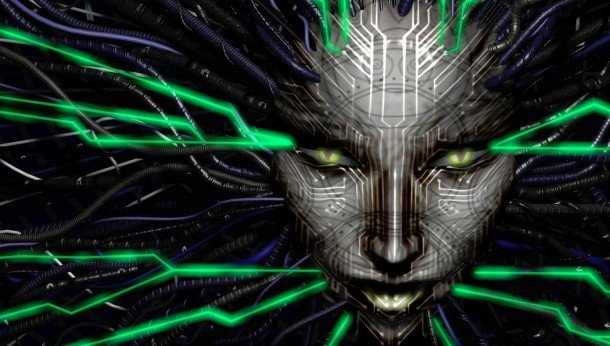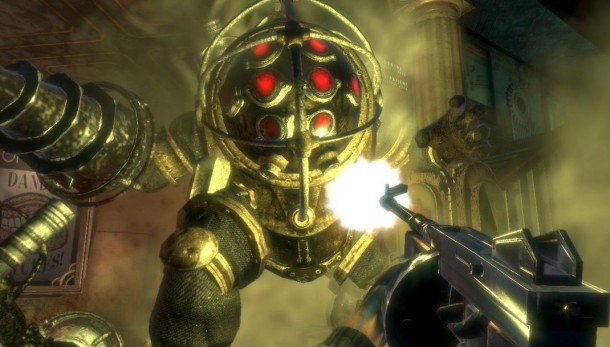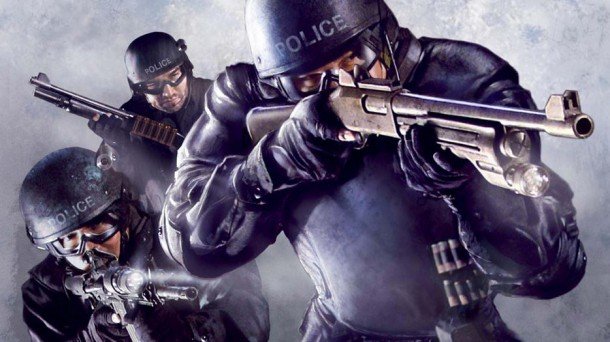
Last week Ken Levine announced that Irrational Games as we know it is coming to an end. Most of the team are to be laid off as the studio that gave us System Shock 2, SWAT 4, Freedom Force and Bioshock shuts its doors. The world knows them as the Bioshock developers, but for PC players, they've offered much more. We gather to reflect on the end of a great studio and celebrate their output.
Tim Clark
Group senior editor
Having experienced several redundancies firsthand, I feel beholden to say that it will be a hugely traumatic time for those involved and that our first thoughts should be with them. Equally, having been there, I know that those sort of public expressions of sympathy, however well meaning, ultimately feel hollow and don't help you make the rent. But completely selfishly, as someone who plays and writes about videogames, who loved the original BioShock and—with minor caveats—also loved Infinite, I feel a sadness that we won't be any more visiting worlds cut from Irrational's cloth.
Whatever your issues with those games' themes and mechanics, in terms of pure art design there are few destinations in the canon as startling and memorable as Rapture's watery mausoleum and Columbia's star-spangled inferno. If you believe, as I at least partially do, Kieron Gillen's idea that games writing makes us travel journalists reporting from imaginary places, then it's hard not to (selfishly) see the closure of Irrational as also being the destruction of worlds we'll now never get to explore.
Sam Roberts
Editor, PC Gamer UK
I think BioShock popularised the first-person shooter/RPG hybrid, non-cutscene storytelling and moral choices in games—that, to me, is Irrational's legacy, getting developers to rethink the presentation of story or the depth of their combat systems. System Shock 2 introduced much of what made BioShock special, but for many of those millions of players entering Rapture, this was an entirely new phenomenon that broadened their perception of what interactive narrative could achieve.
Infinite continued that, for me, and like BioShock explored the kind of mature subject matter that is rarely touched upon by triple-A games. That Infinite was contentious is fine with me—it's big, beautiful and incomprehensible, but worth talking about in a way that games so rarely are.
Keep up to date with the most important stories and the best deals, as picked by the PC Gamer team.
The people at Irrational have changed immeasurably over the years, of course, but what a legacy to have every one of its seven titles be lauded by players and the press. That moniker will always stand for quality. If you're mourning the studio, I recommend listening to the Irrational podcasts , which offer a fascinating cross-section of a studio loaded with talented people—it's a real sadness that this culture no longer exists, and I wish the very best to those affected by the closure.

Tom Senior
Web editor
"I am winding down Irrational Games as you know it," Ken Levine wrote last Tuesday . Whether or not the Irrational name lives on in Levine's new small new endeavour seems moot. This will be the end of Irrational's output as we know it. Console players will know Irrational as the BioShock developers, but we knew them first as the team behind System Shock 2 and SWAT 4. Their first game — a cyberpunk horror set in a drifting space hulk, complete with a manic rogue AI. Their last—a blitz through a collapsing society in a floating city. In between they made a great co-op friend-tasering sim called SWAT 4, and a superb superhero adventure—Freedom Force. And Tribes Vengeance. Man. It's painful to lose a studio with the imagination and boldness to build those worlds.
It's a sad fact that studios are downsized, moved and disbanded all the time, but Levine's message, in which he seems to take personal responsibility for the studio's downsizing, has made this a slightly unusual case. Overzealous corners of the internet jumped on the wording of the post in minutes. The idea of a great studio meeting its demise at the hands of an auteur gone mad is seductively simple, and travels well in 140 characters.
The real story is likely a more familiar one. The huge costs of blockbuster development continue to grow, and Infinite languished in development for many years. In the high-level staff changes , rumours of scrapped multiplayer modes and regular delays, there were hints at a fraught development process. In that scenario even millions of sales can deliver below-estimate profits. A few years back, 2K Marin were smushed into 2K Australia. Like any publisher, Take Two are happy to reform their brace of studios. But with Irrational breaking up, who will take over the Shock series?
It won't be Ken Levine. He's heading up a team of 15 to work on "highly replayable" games that are "narrative-driven." Perhaps he's taking notes from the success of former Irrational and 2K Marin designer Steve Gaynor and, formerly of 2K Marin, Karla Zimonja. With Johnnemann Nordhagen they founded the Fullbright Company, who turned around their narrative-driven debut game , Gone Home, in less than two years to critical success.
If market forces have put an end to Irrational, then the studio has suffered the same fate as Thief and System Shock developers, Looking Glass Studios. The parallels between the two stretch beyond their shared staff members. The design ethos that built System Shock has filtered into the BioShock games, and there's tremendous variety to the output of both studios. Irrational's demise is a blow, but those design ideas, and the flair and skill that went into the construction of the floating city of Columbia will continue to coarse through the industry, as the talent of Looking Glass and Ion Storm did in the 2000s. I'll remember them for the clinical blue-white corridors of the Von Braun, the disturbing scenes at the Fairfax residence in SWAT 4, and those tense first steps into Bioshock's lighthouse. We'll surely see flashes of Irrational's brilliance in many games to come.
Wes Fenlon
Features Editor
BioShock was a masterful maze of abandoned homes and once-thriving businesses, with the remnants of former lives told through scattered items and bodies and audio logs. It had personality, even when it was haunting. But nothing else in the game could compare to Fort Frolic, the weirdest, creepiest, funniest place in Rapture. It's easily my favorite level in BioShock, and one of the most evocative video game levels I've ever played. Sander Cohen's artistic presence permeates every corner of Fort Frolic—he made that part of Rapture his canvas, and he painted it with madness.
Later in the game, the showdown with Andrew Ryan is BioShock's big thematic reveal. It says something very direct about how we play games, and player choice, and the dissonance between our thoughts and actions. But Fort Frolic has a subtle, perfect moment of dissonance of its own, when The Nutcracker's Waltz of the Flowers begins playing and Cohen's horribly disfigured, beautifully acrobatic Splicer ballerinas come for your life. I was in awe, and completely freaked, as I ran from the Splicers, the music crescendoed, and Cohen yelled "Smile! Smile!" in the background.
The dissonance between the Waltz's beauty and the game's horror—that's the moment from BioShock that's going to stick with me forever, and it's on a shortlist of never-forget gaming memories for me. It's a shame that everyone at Irrational who collaborated to make that moment possible—artists and animators and writers and sound designers—won't have a chance to make another one together.

Phil Savage
Staff writer
It feels callous to look to the future when so many of the studio's staff will now be looking to secure their present. The thing I hope for is that, as Irrational's former employees move on to new things, the ideas and ambition that the studio strived to achieve will germinate throughout the industry. A lot of studios are going to be hiring some phenomenal talent, and I suspect a lot of new indie teams are about to appear as well. Both are an exciting prospect, because, while few development teams could boast the budget of late-era Irrational, the design-led philosophy has already paid dividends for smaller, more focused games.
It's telling that two of PC Gamer's favourite games of last year— Gone Home and Card Hunter —had former Irrational staff among their teams. One provided an engaging, character-led narrative through atmosphere and exploration, while the other deftly weaved two genres into a inventive and satisfying hybrid.
There's been plenty of speculation about whether the type of games Irrational make have a future. Really, it depends on whether you associate them with sprawling spectacle, or systemic diversity. I'd argue that Irrational's strength—from System Shock 2 through to BioShock Infinite—has been in the latter, and in the way their systems filtered through to the story and presentation. Those lessons can be applied whatever sized game someone's making.
Whether from Levine, his former staff, or other developers who are inspired by their games, Irrational's legacy will be felt for a long time to come.
Cory Banks
Managing Editor
I want to be angry about Irrational Games. I want someone to blame. I could be furious at Ken Levine, the studio's creative director and head honcho, who authored the press release revealing that Irrational “as you know it” was going away. How dare he fire 90 percent of the studio's staff, just so he can make smaller games? Because surely it was just that simple, right?
Or maybe I blame Take-Two Interactive. It's been speculated that BioShock Infinite, Irrational's final game, took so long to make and had such a troubled development period that the game's $4 million in sales isn't enough profit for the bigwigs. Maybe, says the Internet, Take-Two decided to pull the plug on the beloved studio, and kept Levine around because he's one of the few "name" developers left. Because that's what corporations do, right?
Maybe I just blame the “dying” Triple-A videogame, or retail shops that charge too much for games and drive customers away, or any number of other variables. Would that make me feel better?
No.
The fact that Irrational Games is gone—at least as we know it—is sad, as is the fact that so many talented developers, engineers, producers, quality assurance testers, and other staff now face the uncertainty of knowing where their next paycheck is coming from. And I want to yell and scream and turn on Caps Lock and launch my fury out into the ether. But it won't help.
What does help, at least for me, is believing that Levine and Take-Two are doing everything they say to help the team that made BioShock Infinite find new jobs. So does remembering that talented people can move on and continue to make their art. And what will ease the immediate pain is going back to play the games that made me love Irrational in the first place: System Shock 2, Freedom Force, SWAT 4, BioShock. Instead of raging against the machines for transgressions I neither know to be true or even understand, I choose to remember and enjoy the games that will be Irrational's legacy. It's not the act of a revolutionary, but it's the best I've got.
PC Gamer is the global authority on PC games—starting in 1993 with the magazine, and then in 2010 with this website you're currently reading. We have writers across the US, Canada, UK and Australia, who you can read about here.


